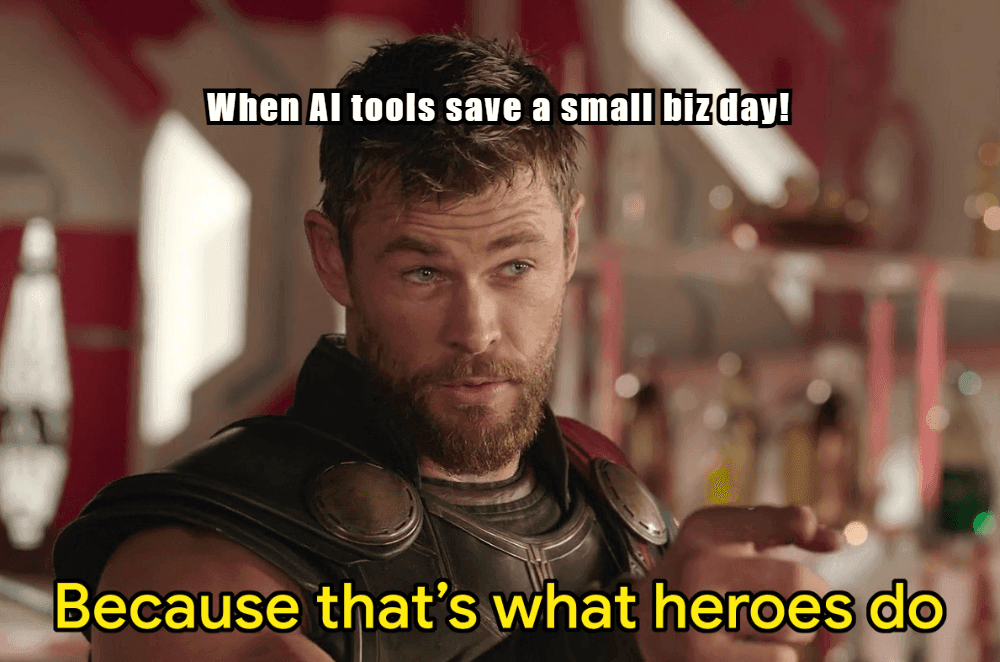A Beginner's Guide to AI Tools for Small Businesses
Artificial intelligence is one of the game-changing technologies for small businesses in today's fast-changing business world. AI tools for small businesses provide a wide range of benefits, such as increased efficiency, cost savings, improved customer service, and better growth opportunities. This detailed guide will explore how small businesses can use AI to streamline operations, boost productivity, and gain a competitive edge in the market.
Understanding AI Tools for Small Businesses
These AI tools for small businesses refer to applications of software utilizing artificial intelligence algorithms, and these do everything from executing tasks and solving problems up to automation. These could help a business in many aspects of its daily operation including service to the customer, marketing, finance, and even human resources. That’s why many small businesses now rely on generative AI development services to create tailored solutions that address their unique challenges effectively.

Advantages of AI Tools for Small Businesses
Time Savor: By making repetitive jobs more efficient with AI, they save ample time that will be engaged more in other crucial and innovative business-related roles.
Cost Cutting: Automating processes and reducing manual labor, AI tools can help small businesses save on operational costs.
Customer Satisfaction: AI-powered chatbots and personalized recommendations help improve customer satisfaction and loyalty
Data-Driven Decision Making: AI tools can analyze large data sets to give valuable insights for better business planning and strategy
Growing Opportunities: AI helps small businesses find new market trends and opportunities for growth.

Key Areas Where AI Tools Can Help Small Businesses
1. Customer Service
AI-powered chatbots and virtual assistants can provide 24/7 customer support that answers common questions and resolves simple issues without the help of humans.
2. Marketing and Sales
AI tools for small businesses can be beneficial in several marketing and sales-related jobs:
Content Creation: AI can create images, blog posts, social media content, marketing copy, and even generate poems. Tools like the ChatGPT Image Generator enhance visual content creation.
Lead Generation: AI machines can detect and qualify leads based on several data points. Lead generation Al can further streamline the process by analyzing patterns and predicting which leads are most likely to convert.
Personalization: AI can analyze customer data to offer personalized marketing campaigns and product recommendations. Additionally, AI can support small businesses referral programs by tracking customer interactions and identifying top advocates, helping automate rewards and streamline growth through word-of-mouth marketing.
3. Finance and Accounting
Small business accounting software powered by AI can automate bookkeeping tasks, provide financial reports, and even predict cash flow.
4. Human Resources
AI tools can streamline recruitment processes, improve candidate screening, and increase employee engagement.
5. Data Analysis and Business Intelligence
AI can process large amounts of data that enables it to find a pattern, trend, and insights to create an informed business decision. For example, AI tools for coding can help developers automate repetitive tasks and improve productivity in software development.

Top AI Applications for Small Businesses
Following is a comparison table about popular AI applications for small businesses;
Tool | Primary Function | Key Features | Best For |
ChatGPT | Language Processing | Content generation, problem-solving | Versatile text-based tasks |
Canva AI | Design | AI-powered design suggestions, text-to-image generation | Visual content creation |
QuickBooks Online | Accounting | Automated bookkeeping, cash flow predictions | Financial management |
HubSpot | CRM | AI-powered content creation, predictive lead scoring | Marketing and sales |
Mailchimp | Email Marketing | Send time optimization, content recommendations | Email campaign optimization |

Step 1: Gauge Your Requirements
Consider your business processes carefully to determine where automation can come in handy or give AI-powered insights.
Step 2: Find Relevant Tools
Browse through various AI tools appropriate for small businesses with relevance to your specific needs, like considering
Budget
Ease of implementing it
Scalability
Integration with present systems
Step 3: Start Small and Grow
Start by introducing AI tools in one or two core areas of your business. As you get accustomed to the technology and see results, expand your use of AI across other departments.
Step 4: Train Your Team
Train your employees on how to use the new AI tools effectively. This will help maximize the benefits and minimize resistance to change.
Step 5: Monitor and Optimize
Monitor the performance of your AI tools and adjust them periodically to continue to serve your business needs.

Overcoming Challenges in AI Adoption
There are several challenges when using AI tools for small businesses. Some of them include:
High Upfront Investment: Some AI tools require a huge upfront investment. However, the long-term cost savings usually offset the initial investment.
Data Privacy and Security: Whichever AI tool you deploy, ensure it follows the rules of the land regarding data protection regulation and has security in it. Keeping up with AI regulations helps businesses use AI tools responsibly while ensuring data protection and ethical usage.
Integration with Current System: Select an AI tool that can be integrated well with current software and workflows.
Ease of Employee Adoption: Employees sometimes resist new technologies. You have to train and support employees enough so that the adoption doesn't become too hectic for them.

Future Trends of AI for Small Businesses
As AI technology advances, there will be even more refined and specialized tools for small businesses in the future. Some of these emerging trends include:
Hyper-personalization: This will allow AI to develop even more customized customer experiences based on individual preferences and behaviors.
Advanced Predictive Analytics: Even better algorithms in AI will provide increasingly accurate sales, inventory, and market trend forecasts.
Voice-Activated AI Assistants: Voice-controlled AI tools will become more common in business operations.
AI-Powered Cybersecurity: Advanced AI systems will be able to help small businesses better protect themselves against cyber threats, while cyber security SEO ensures that valuable cybersecurity solutions and insights are easily discoverable by those who need them most.

Conclusion
AI tools for small businesses can change the way you operate, and increase efficiency and growth. Proper selection and implementation of AI tools can level the playing field with bigger competitors and position you for long-term success in a digital world.
So go ahead and get started, start small, focus on your business, and continuously evaluate and improve. AI will be your sidekick to help you achieve your business goals and disrupt your industry.
Frequently Asked Questions
Q: Are AI tools expensive for small businesses?
A: While some AI tools can be costly, many affordable options are available for small businesses. Many providers offer tiered pricing plans or free versions with basic features.
Q: Do I need technical expertise to use AI tools?
A: Many AI tools are user-friendly and do not require high technical knowledge. However, some basic training may be required to be able to use them maximally.
Q: Do AI tools replace human employees?
A: AI tools are there to augment human capabilities and not replace them. They will take care of routine tasks so that the employees can focus on more complex and creative work.
Q: How do I ensure that my data is safe when using AI tools?
A: Select reputable AI tool vendors with robust security measures, read the terms of service and privacy policies, and ensure compliance with data protection regulations.